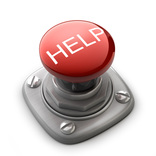
Develop a Family Disaster Plan
In order to keep your family safe in an emergency, it is important to plan in advance what you will do. Review your immediate surroundings, and take note of whatever you have on hand to take care of yourself and your loved ones. Think about the places where your family spends time: school, work and other places where you might be when a crisis happens. Ask about their emergency plans. Find out how they will communicate with families during an emergency. If they do not have an emergency plan, consider helping develop one.
1. What Could Happen in Your Area?? - EARTHQUAKES - FLOODS - MUDSLIDES - FIRES - LONG TERM POWER OUTAGES
- Learn what your community’s warning signals sound like and what you should do when you hear them.
- Ask about animal care after disasters. Animals may not be allowed inside emergency shelters due to health regulations.
- Find out how to help elderly or disabled persons.
- Find out about the disaster plans at your workplace, your children’s school or daycare center and other places your family spends time.
Meet with your family and talk about why you need to prepare for a disaster. Explain the dangers of fire, severe weather and earthquakes to children. Plan to share responsibilities and work together as a team.
Discuss the types of disasters that could happen and what to do.
- Pick two places to meet:
- Right outside your home.
- Outside your neighborhood in case you cannot return home. Make sure everyone knows the address and phone number of the place where you plan to meet.
- Ask an out-of-state friend or family member to be your “family contact.” All family members should call this person and tell them where they are.
- Talk about what to do in an evacuation. Plan how to take care of your pets.
- Remember, the best emergency plans are those with very few details.
- Keep emergency telephone numbers by phones.
- Teach children how and when to call 911.
- Show each family member how and when to turn off the water, gas and electricity.
- Check if you have adequate insurance coverage.
- Teach each family member how to use the fire extinguisher, and show them where it is kept.
- Install smoke detectors on each level of your home, especially near bedrooms.
- Look around your home for possible hazards.
- During a disaster, ordinary objects in your home can cause injury or damage. Anything that can move, fall, break or cause a fire is a home hazard. For example, a hot water heater or a bookshelf can fall. Inspect your home at least once a year and fix potential hazards. Contact your local fire department to learn more about home fire hazards.
- Stock emergency supplies and assemble an emergency supply kit.
- Take a Red Cross first aid and CPR class.
- Determine the best escape routes from your home. Find two ways out of each room.
- Find the safe spots in your home for each type of disaster.
- Keep a smaller disaster supplies kit in the trunk of your car.
- Keep a portable, battery-operated radio or television and extra batteries. Always keep a supply of extra batteries.
- Make two photocopies of vital documents and keep the originals in a safe deposit box. Keep one copy in a safe place in the house, and give the second copy to an out-of-town friend or relative.
- Take a complete inventory of your home, garage and surrounding property. This list could help you prove the value of what you owned if your possessions are damaged or destroyed and can help you to claim deductions on taxes.
- Quiz your kids every six months so they remember what to do.
- Conduct fire and emergency evacuation drills.
- Replace stored water every three months and stored food every six months.
- Test and recharge your fire extinguisher(s) according to manufacturer’s instructions.
- Test your smoke detectors monthly and change the batteries at least once a year.

 RSS Feed
RSS Feed